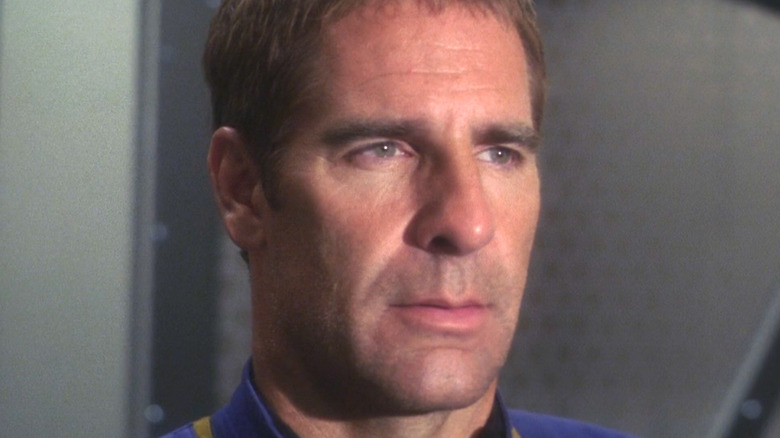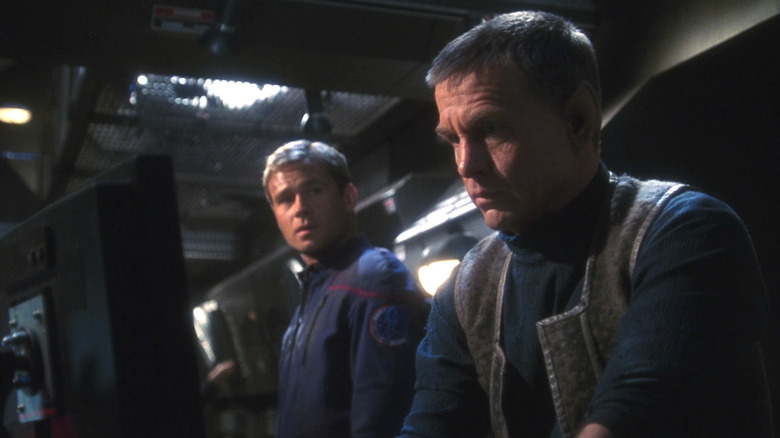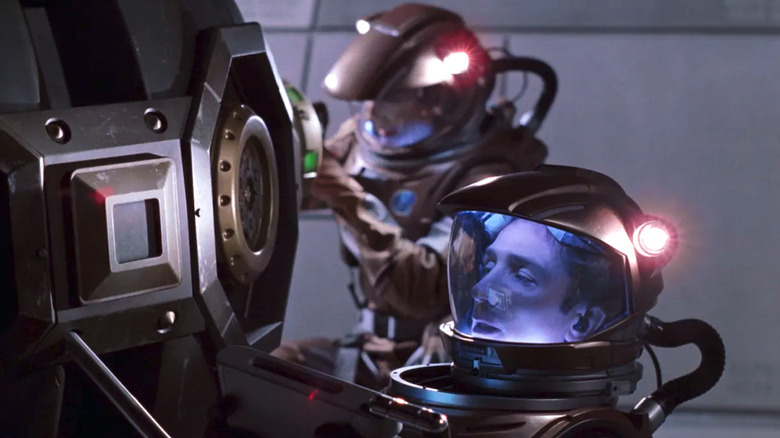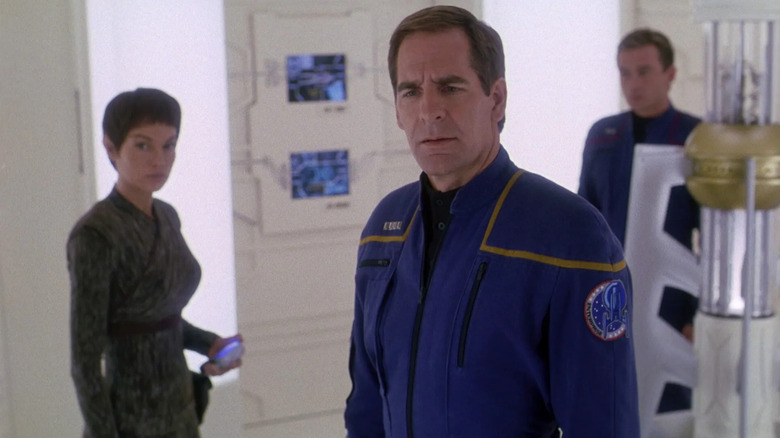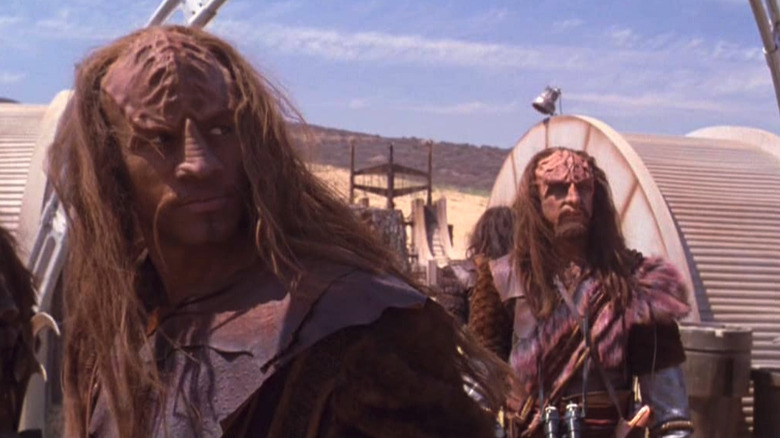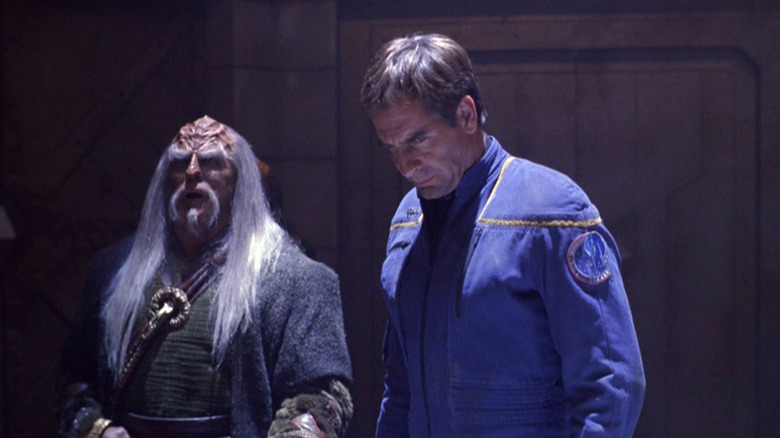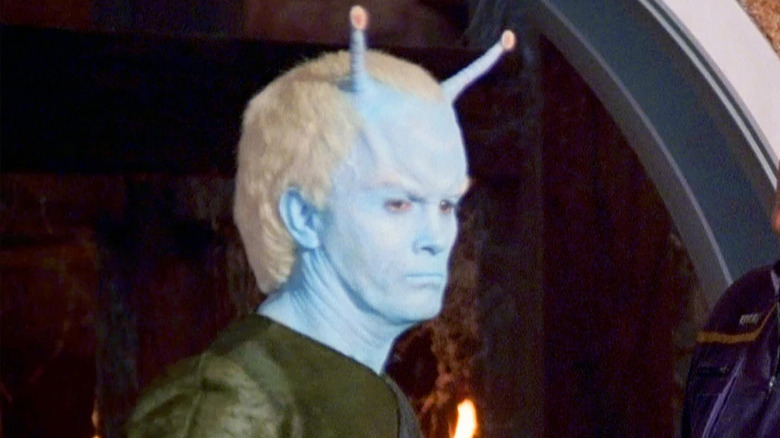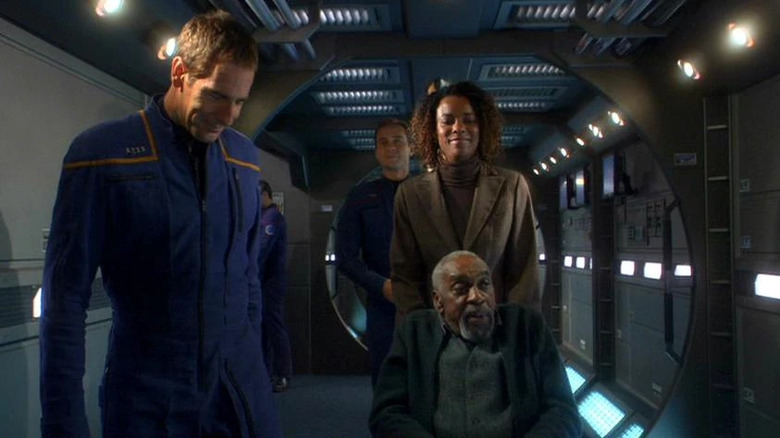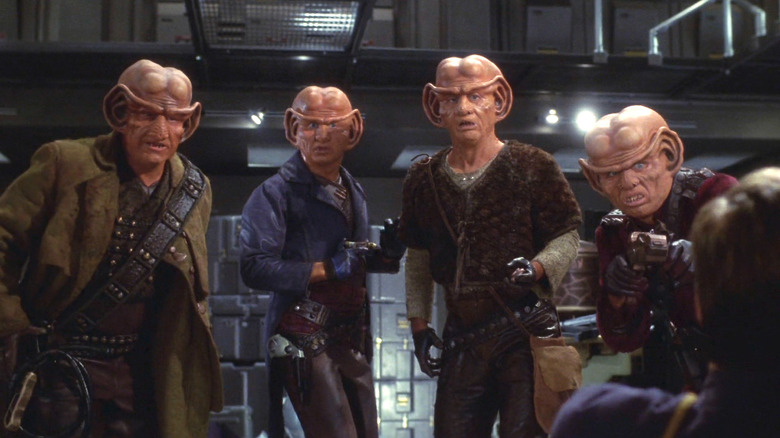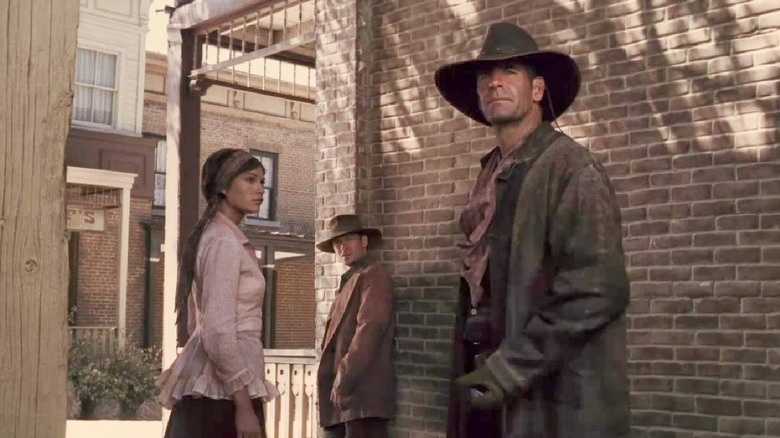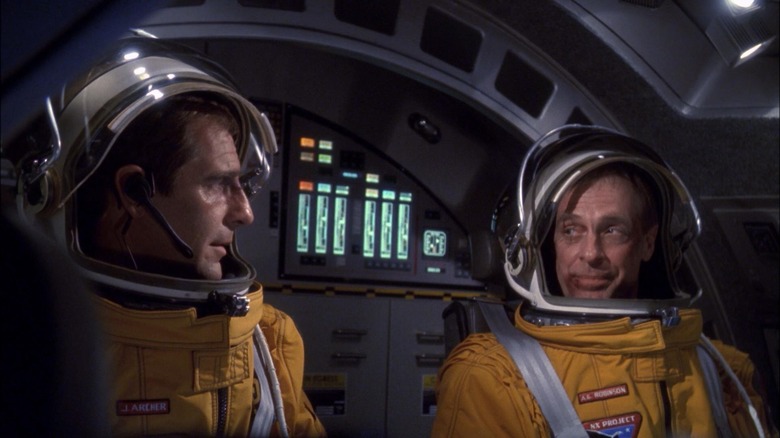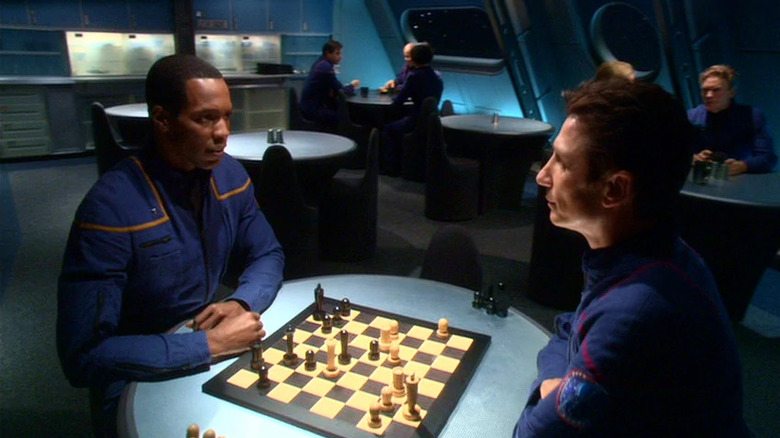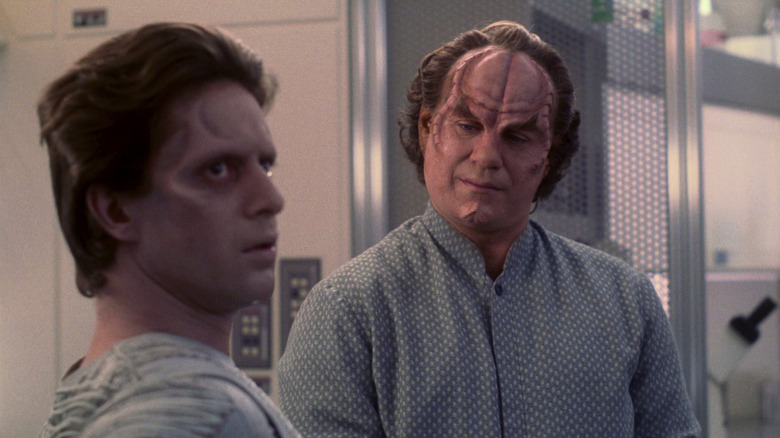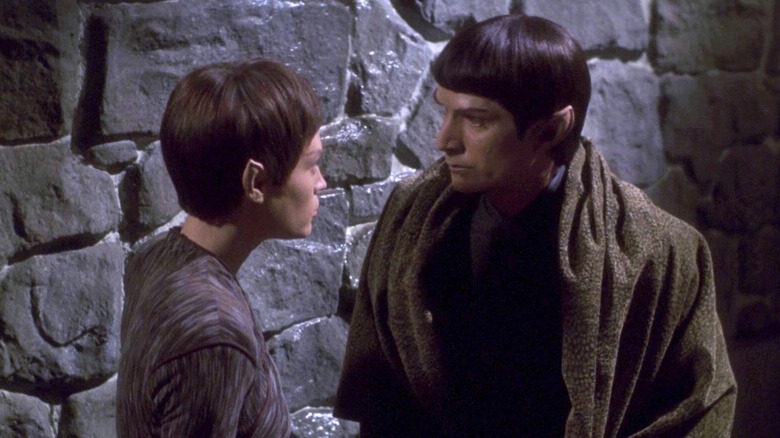The Most Underrated Episodes Of Star Trek: Enterprise
The fourth live-action "Star Trek" spin-off series launched in 2001 after the conclusion of "Voyager," "Star Trek: Enterprise" is often credited with killing the franchise on television. As such, the prequel series is perhaps the most underrated in all of "Trek." While it's true that the show was canceled after four seasons, and "Trek" wouldn't return to the small screen for more than a decade, the series still has plenty of great episodes.
Much has been made about the Xindi War story that dominates Season 3 of "Enterprise" — an early example of serialized storytelling when it was just gaining popularity in the early 2000s. Some of the show's best episodes debuted that season, featuring darker and grittier narratives than anything the series had seen before. The final season of "Enterprise" was also lauded as a step up, with new showrunner Manny Coto ("24") delivering bigger, bolder stories with deeper connections to the broader "Star Trek" lore.
But there are many more episodes that never seem to get their due, especially in the first two seasons, which are largely overlooked. If you're looking for some fun adventures that many fans seem to have forgotten, then polarize your hull plating and recharge those phase cannons, because these are the most underrated episodes of "Star Trek: Enterprise."
E² (Season 3, Episode 21)
When it comes to high concept, mind-bending stories, most "best of" lists for "Star Trek: Enterprise" focus on "Twilight," which many understandably consider the greatest episode of the entire series. But don't discount "E²," another time-twisting tale that lands right in the middle of Season 3's Xindi War arc and features some of the best drama the show ever produced.
On a mission to meet with a Xindi ally, Archer is stunned to encounter a version of his own vessel — a heavily enhanced and nearly unrecognizable Enterprise. The ship's captain Lorian warns Archer that if they enter the corridor of space ahead, they'll be thrown back in time more than a century — the fate that befell his parents, Trip and T'Pol. Since then, Lorian's Enterprise has become home to generations of inhabitants descended from Archer and his crew. Now they believe that by working together, they can avert the Xindi crisis once and for all.
By addressing the will-they-won't-they romance between Trip and T'Pol and forcing Archer to face the personal stakes of his mission, "E²" becomes much more of a character-driven story than the series is used to. While it may not be among the show's absolute best, it's definitely one of its most underrated.
Minefield (Season 2, Episode 3)
Being set so early in the "Star Trek" timeline, "Enterprise" faced many limitations during its run, like not being able to use classic villains like the Borg, the Cardassians, or even the Romulans. Similar to how the highly acclaimed "Regeneration" finds a clever way to include the Borg, the less acclaimed Season 2 episode "Minefield" features a terrifying encounter with the Romulans a century early.
It all starts with Captain Archer trying to get stoic weapons officer Reed to open up. Their meeting is interrupted when the Enterprise is struck by a cloaked mine. A second mine attaches itself to the ship, and when Reed leaves the Enterprise in an EV suit to dislodge it, he's impaled by mechanical arms that leave him injured and helpless. Now it's up to Archer to disarm the mine and extricate Reed from its grasp before it destroys them all. Stuck on the outside of the ship together, the captain and his weapons officer finally get to have their heart-to-heart, all while a looming Romulan vessel monitors their situation.
A taut and suspenseful story, it lacks the big action of later, more well-reviewed "Enterprise" installments, but it's still one of the best edge-of-your-seat episodes in the series.
Dead Stop (Season 2, Episode 4)
In some ways, "Dead Stop" can be viewed as the second part of the "Minefield" story, but it's a strong entry in its own right and perhaps an even more underrated one. Here there are no Romulan starships or foreboding hints at a coming war. Instead, the episode sees the Enterprise still reeling from its encounter with an enemy mine and in dire need of repairs. But in an era when there are no starbases or sister ships to render assistance, Archer and his crew are in the unlikely position of asking for help.
With their warp drive damaged, they can't make it back to Earth, but fate lends them a hand when a passing Tellarite ship informs them of an alien repair station not far from their location. Upon arrival, they discover an unmanned, automated station that can complete the needed repairs using technology far more advanced than they've ever seen. But when Reed and Tucker get curious about the station's inner workings, they learn that it may be more than meets the eye. And when Mayweather turns up dead, it seems that it just might be deadly, too.
A compelling look at what the early days of Starfleet were like when ships were on their own in deep space, "Dead Stop" is a creepy and intense thriller that might deserve to be in the show's top 10.
Marauders (Season 2, Episode 6)
Much is made of the three-part "Star Trek: Enterprise" Season 4 story arc about the Klingons creating genetically modified super-soldiers. But despite the acclaim that trilogy often gets, it's not the only great Klingon saga in "Enterprise." Another is Season 2's "Marauders" — a "Star Trek" take on a classic Western story. While some may find the premise played out, it's still fun and exciting, and it does a good job of showing what the Klingon Empire was like in this earlier era.
Out on the reaches of the final frontier, Archer and the Enterprise visit a desolate alien colony in the hopes of trading for some supplies. Instead, they find a beleaguered group of miners in dire need of medical supplies who've been terrorized by a band of outlaw Klingons for years. Unwilling to sit idly by and let them continue to be brutalized, Archer helps the colonists with a daring plan to fight back.
Full of classic "Star Trek" action, "Marauders" has an appropriately old-school Western vibe. And as a clear homage to "Seven Samurai," it works, taking advantage of the series' prequel premise by making the Klingons despicable villains once more.
Judgment (Season 2, Episode 19)
An episode that takes its cues from the great movie "Star Trek VI: The Undiscovered Country," "Enterprise" Season 2's "Judgment" expands on the Klingon justice system. Though it might not be the kind of Klingon conflict that fans may have been hoping to see, it still delivers high drama in a time-tested "Trek" premise that's always been under-appreciated.
Now an enemy of the Klingon Empire, Captain Archer is taken prisoner and must face the consequences for aiding a group of rebels, as well as for his actions in the series premiere "Broken Bow" and "Marauders." He's not alone, however, as he's given an advocate in the form of Kolos — a disgruntled and aging Klingon legal scholar who seems to be a rebellious agitator among his own people. As Archer's crew races to find a way to rescue him, the captain is railroaded in court. The Klingon prosecution offers a twisted version of the events just prior to the episode, making him out to be a monster.
In addition to being a "Trek" courtroom classic, "Judgment" also features the return of beloved franchise veteran J.G. Hertzler, who previously played General Martok in "Deep Space Nine." With elements of "Rashomon" and "A Few Good Men," the episode blends disparate elements effectively and gives them a Klingon twist.
The Andorian Incident (Season 1, Episode )
Introduced in the original "Star Trek" episode "Journey to Babel," the blue-skinned alien race called Andorians is sadly nowhere to be found in "The Next Generation," "Deep Space Nine," or Voyager." But "Enterprise" makes up for that, giving the Andorians a major role in the series, which all starts with the underrated Season 1 episode "The Andorian Incident." The first appearance of recurring character Shran (fan favorite Jeffrey Combs), the episode is unfortunately often passed over in discussions of the show's best installments.
While on an early exploratory mission, Archer and the Enterprise stop to visit a renowned Vulcan monastery, inadvertently interrupting an Andorian attack in progress. Led by the ruthless Commander Shran, the Andorians believe the monastery is hiding a surveillance operation spying on their people, and Archer and his crew become their newest hostages. Though Shran and his forces appear deeply paranoid and violently aggressive, it becomes clear that their allegations of Vulcan impropriety may not be so far-fetched.
In addition to featuring the long-awaited return of the Andorians, the episode is also the first hint that the Vulcans may not be the innocent, pious allies fans have always known. While this upset some Trekkies, it went a long way in providing some compelling backstory to the long-standing "Trek" lore.
Daedalus (Season 4, Episode 10)
Inexplicably, "Daedalus" is often ranked as one of the worst episodes of "Star Trek: Enterprise." While it may never make anyone's top 10, it's a compelling entry — a tragic story that in many ways evokes the excellent "Star Trek: Deep Space Nine" episode "The Visitor." Like that story, "Daedalus" centers on the bond between a father and a son. When one is lost, the other spends his entire life trying to bring him back.
The episode introduces audiences to Emory Erickson (guest star Bill Cobbs), the man who invented the iconic molecular transporter. He arrives on the Enterprise to perform upgrades, and we learn that Archer grew up close friends with Erickson's daughter Danica (Leslie Silva) and son Quinn (Donovan Knowles), who died in an early transporter test. When a strange apparition begins appearing on the ship and endangering the crew, Archer realizes that routine upgrades aren't the true purpose of Erickson's visit — he's actually there to resurrect Quinn, who he believes may be trapped in some kind of horrific limbo.
In addition to providing rare backstory elements to the history of the transporter, "Daedalus" is a heartbreaking story of a father's love and his lifelong obsession with making up for the mistakes he's made.
Acquisition (Season 1, Episode 19)
"Star Trek: Enterprise" has drawn criticism for featuring some alien races who don't really fit in its early part of the franchise timeline. However, when the series did revisit fan favorites like the Borg or the Romulans, they often yielded some of the show's most underrated episodes, including Season 1's "Acquisition." Featuring a surprise appearance by the Ferengi — a race not officially encountered by humans until the "Star Trek" era of Captain Jean-Luc Picard – the episode is a madcap comedic adventure.
"Acquisition" opens with the Enterprise adrift and the entire crew apparently unconscious. But Trip is stuck in quarantine after returning from an away mission and quickly realizes that the starship has fallen prey to a group of alien pirates who the audience will recognize as Ferengi. "Trek" veterans Jeffrey Combs, Clint Howard, and Ethan Phillips guest star as a group of marauders in search of the captain's fabled stash of gold, and they set out to steal everything that's not bolted down. Archer and Trip are forced to put on a clever act to stop the Ferengi and retake the ship.
Admittedly, "Acquisition" isn't exactly brilliant television, and it's more of a guilty pleasure entry in the series — a breezy romp with some fun and funny set-ups. But with a top-notch guest cast and a light-hearted tone, the episode is still a good time.
North Star (Season 3, Episode 9)
The Wild West setting of the "Star Trek: Enterprise" Season 3 episode "North Star" may seem goofy on the surface, but it's a solid story with a timeless premise and a look and feel that evoke classic "Trek." And with Scott Bakula as a hero in a place forgotten by time — out to put right what once went wrong — it almost feels like an episode of "Quantum Leap."
Like the 1967 "Star Trek" episode "Spectre of the Gun," "North Star" sees the Enterprise beam down to a planet that's eerily patterned after 19th-century Earth, specifically the American West. But this is no illusion built by telepathic aliens, as Archer finds the world inhabited by both humans and another race called the Skagarans, who are treated as second-class citizens. After befriending a local sheriff named MacReady, Archer learns that the local inhabitants are descendants of humans from the 1800s who were brought to the planet against their will. After revolting against their alien captors, the humans kept them under their thumb.
A story about racism and tolerance with a classic "Trek" vibe and plenty of pure Western action, "North Star" may come across as tongue-in-cheek, but it's a solid tale with an effective message.
First Flight (Season 2, Episode 24)
"Star Trek" has done quite a few flashback episodes over the years, and "Enterprise" has two big ones. While "Carbon Creek" is better remembered, "First Flight" shouldn't be overlooked. An important episode that helps flesh out the character of Jonathan Archer, its focus on smaller drama is quickly overshadowed by the two more action-heavy episodes that follow it, including the season finale featuring the debut of the Xindi.
"First Flight" sees Archer receive word that someone named Captain Robinson has died in an accident back on Earth. The episode then flashes back to reveal the events leading up to the launch of the Enterprise, when Starfleet was still unsure of who should captain their first vessel with a warp five engine. Years earlier when the technology was still unproven, Robinson (guest star Keith Carradine) was the odds-on favorite — a mix of veteran pilot and seasoned explorer — with Jonathan Archer seen as an upstart underdog. In a fierce fight for the job, they're forced to work together to save the program when the Vulcans want to shut it down.
A poignant story of friendship, family, and legacy, "First Flight" is a great watch. Carradine and Bakula make a strong duo, playing a pair of rivals who put aside their differences to reach a common goal.
Observer Effect (Season 4, Episode 11)
Amid a slew of highly-rated multi-part stories, including a guest appearance from "TNG" regular Brent Spiner and a two-part jaunt into the Mirror Universe, "Star Trek: Enterprise" delivered a few standalone stories in Season4 that have gone sorely underrated. One of them is "The Observer Effect," an eerie mystery that ties back to an episode from the original "Star Trek" with the appearance of the Organians.
Like so many classic episodes of "Star Trek," "The Observer Effect" sees a deadly virus sweeping through the ship. But the peril the crew faces as plague victims pile up isn't the only problem they're facing. Two non-corporeal life forms invade the ship, intent on observing the Enterprise crew and how they handle the pathogen that's sure to kill them all. Inhabiting the bodies of two crew members, the aliens watch as the virus spreads among the crew while Dr. Phlox races to find a cure. Ultimately, Archer becomes aware of the alien presence, and the two beings must decide whether to let the entire ship be decimated by the disease or intervene and save their lives.
With a slowly building sense of dread as time runs out for the crew, "Observer Effect" is nearly a horror movie. But because it's surrounded by bigger stories in Season 4, it's gone severely underrated.
Dear Doctor (Season 1, Episode 13)
With a jovial attitude and an upbeat demeanor — not to mention a disturbingly wide, CGI-enhanced smile — Dr. Phlox often provides comic relief and levity on "Star Trek: Enterprise." Episodes centered on Phlox are usually pretty lighthearted, but in an early Season 1 outing, he plays the central role in one of the show's most grim and underrated episodes, "Dear Doctor."
While corresponding with fellow physician Dr. Lucas, who's stationed on his home planet of Denobula, Phlox relays the details of a new and troubling assignment. The Enterprise has arrived at the planet Valakis, home to a pre-warp space-faring civilization who've asked for the ship's assistance in developing a cure for a deadly plague sweeping their world. In the days before the Prime Directive, Archer and Phlox agree to lend a hand, but as the doctor begins studying the disease — and a group of less-advanced humanoids who live on the planet — he makes a disturbing revelation and comes to question their role in seeking a cure.
by putting the doctor and Archer at odds over the ethics of their mission to help the Valakians, "Dear Doctor" delivers a powerfully thought-provoking "Star Trek" story.
Stigma (Season 2, Episode 14)
"Star Trek" has gotten seriously political on many occasions, touching on even the most sensitive of hot-button issues. But one particular issue went unaddressed during a crucial time, as producers rejected a plot about the AIDS epidemic early in the run of "Star Trek: The Next Generation." It wouldn't be until "Enterprise" that the franchise finally tackled the issue head-on with the Season 2 episode "Stigma," where the allegory is strikingly clear.
Following the events from an earlier episode, T'Pol is suffering from a neurological condition called Pa'nar Syndrome. For Vulcans, the only way to contract this potentially deadly disease is through a mind meld, which at this point in Vulcan's history isn't socially accepted, and is even considered subversive. Hesitant to ask for help from her own people because it will out her as a mind-melder, she's eventually discovered and becomes a shamed outcast. Wanting more than just a cure, though, T'Pol fights for those like her to be accepted and end the bigotry towards the mind-melding dissidents who want nothing more than to be allowed to live in peace.
Despite its important message, "Stigma" has never gotten the attention it deserves. More than just a moving story of pain and prejudice, the episode is also full of great performances and may be Jolene Blalock's best episode as the science officer.
